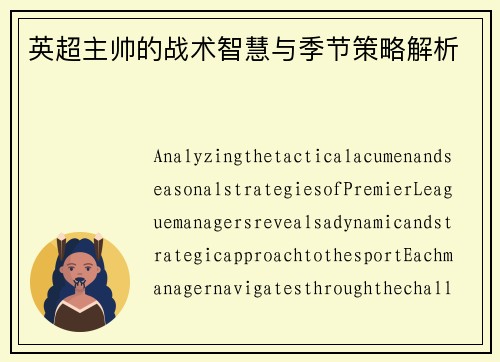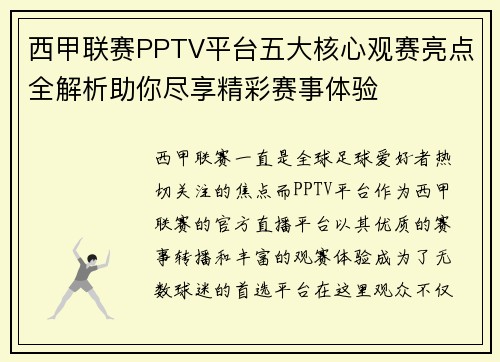Analyzing the tactical acumen and seasonal strategies of Premier League managers reveals a dynamic and strategic approach to the sport. Each manager navigates through the challenges of a season with distinct tactical philosophies and timely adjustments, shaping the competitive landscape of English football.
1、Tactical Philosophy and Adaptability
Managers in the Premier League exhibit a diverse range of tactical philosophies, each tailored to their team's strengths and the demands of modern football. These philosophies often evolve throughout the season, influenced by opponent analysis, player form, and injury situations.

Strategies can vary from high-pressing systems designed to dominate possession and create scoring opportunities to defensively solid formations that prioritize counter-attacking prowess. The ability to adapt these strategies mid-game or between matches is crucial, showcasing a manager's tactical flexibility.
Furthermore, the utilization of squad depth and rotation during congested fixture periods underscores a manager's strategic foresight, aiming to maintain player fitness and performance levels across multiple competitions.
2、Player Development and Tactical Integration
Effective management extends beyond match-day tactics to include player development and tactical integration throughout the season. Premier League managers invest significant effort in honing individual skills and fostering cohesive team play.
Training sessions serve as laboratories for tactical experimentation, where managers refine positional awareness, set-piece routines, and defensive structures. This meticulous approach aims to maximize player potential and ensure seamless tactical execution during competitive fixtures.
Moreover, integrating new signings into existing tactical frameworks requires astute planning and communication, ensuring a seamless transition that enhances squad depth and strategic flexibility.
3、Strategic Approaches to Key Fixtures
Key fixtures in the Premier League calendar present pivotal moments for managers to showcase their strategic prowess. Matches against title contenders or relegation-threatened teams demand nuanced approaches tailored to specific opposition strengths and weaknesses.
Strategies may involve targeted man-marking of key opponents, tactical adjustments to exploit defensive vulnerabilities, or a focus on set-piece proficiency to secure vital points. These strategic decisions often hinge on meticulous opponent scouting and analytical preparation, highlighting the managerial commitment to meticulous game-planning.
Furthermore, managing player emotions and psychological resilience during high-stakes fixtures underscores a manager's ability to inspire confidence and tactical discipline among the squad.
4、Seasonal Adaptations and Long-term Planning
Successful Premier League managers navigate the rigors of a season through astute seasonal adaptations and long-term planning. This involves balancing immediate tactical requirements with sustained squad development and recruitment strategies.
Throughout the season, managers assess player fatigue, injury trends, and tactical effectiveness, making calculated adjustments to optimize team performance. This adaptive approach extends to competitions beyond domestic leagues, where strategic prioritization ensures peak performance in UEFA competitions or domestic cup tournaments.
Long-term planning encompasses squad rebuilding cycles, youth academy integration, and strategic recruitment aimed at sustaining competitive excellence over multiple seasons. This holistic approach underscores a manager's role as both tactician and strategist in shaping a club's footballing identity and success.
总结:
Premier League managers exemplify unparalleled tactical acumen and seasonal strategies, navigating dynamic challenges with precision and foresight. Their ability to innovate, adapt, and inspire defines the competitive landscape, showcasing football management at its strategic zenith.
hthsportsThroughout the season, these managers refine their tactical approaches, integrate new talents, and strategize for key fixtures, embodying the blend of art and science that defines modern football management. By balancing short-term tactical demands with long-term strategic visions, they not only shape match outcomes but also forge enduring legacies within the sport.



